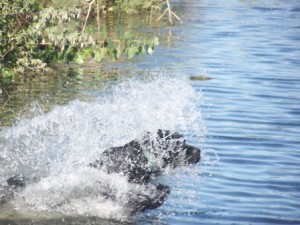Hunt Tests
PVHRC members work hard to train their dogs. HRC defines three levels of capability — started, seasoned, and finished hunting retrievers. Members participate in hunt tests against standards of performance for their and their dog’s abilities.
A hunt test is a big event. Started, seasoned, and finished hunt tests are performed through out the day. Children are welcome additions as future hunters. Often puppies get to participate at the evening social after the hunt. There’s lots of new terms here, so we provide a glossary to help. Rich Carpenter provides this great introduction of what hunt tests are all about.
Hunt Tests
Author: Rich Carpenter
Expect to be there most of the day. Expect to bring your dog in a crate or other way that the dog can comfortably spend the day and not destroy your car, get in a fight with somebody else’s dog, or get loose and get into the tests going on. Feel free to bring the kids, but remember to bring what’s needed to keep them dry and their tummies full. And water– for you, the kids and the dog. Likewise food. Don’t forget your leash and whistle. Sunscreen, bug spray and a comfortable folding chair are also a good idea. If you’re running a dog, camouflage clothing is required. Even if you’re only attending the hunt test as a spectator, it’s important to wear camouflage or at least earth-tone clothing. Bright colored clothing can distract dogs who are running and being directed by their handler.
The judges will try to give your dog plenty of time, but at some point if the dog is having trouble, expect for them to ask you to pick the dog up. If you are at a loss for what to do, a few questions will hopefully get you pointed to a more experienced member to help.Get your dog out of the kennel box a bit before it is time to run. Walk the dog around a bit to get the kinks out. If you don’t, you shouldn’t be surprised when he stops to urinate on the way in from the first retrieve and forgets where he laid the bird. It is very important not to let your dog get loose and into the test.
This is most apt to happen when airing (exercising and letting the dog relieve themselves) the dog too close to the test. If there is a long wait, drive to a different part of our training grounds and throw some dummies. If you are at all close to the test, keep your dog on a leash.
If you are new and haven’t a clue about what is going on or what is expected, don’t be bashful about saying so. We all were there once and you’ll find people very helpful and understanding.
Try to be around and stay in touch with the marshal so they don’t have to keep looking for you. On the other hand, if you have lots of waiting time in Started, go watch a little of the Seasoned or Finished. All those were started dogs once, and many of their handler/trainers were as green as you a couple years ago. Look, dream and plan, one day you’ll be up there in Seasoned or Finished doing what today seems unreachable. It’s possible, ask the handlers in those tests.
The Tests Themselves. Expect birds to be used in all tests. Popper guns and poppers (blanks) will be provided. Judges will explain the test before hand. If you have questions when you get to the line, ask. If you have several dogs, ask the stake marshal to have them separated if they are too close in the run order, so you have time to take one back before the next runs. Even if you fail the first series, you run the rest of the test. This is what makes HRC different from other national retriever test sanctioning bodies, as does the hunting realism and the handler shooting from the line in the advanced tests. For the actual hunt rules used in a licensed hunt see the rule book that comes with your membership from the national HRC, Inc.
Hardmouth (the dog damages bird by chewing in the process of retrieving it) will fail a dog in Started, Seasoned or Finished. Expect to see duck decoys in Started, and any kind of decoys in Seasoned or Finished. The bird throwers and guns will almost always be hidden from view. It is tacky (and against the rules) to point out the bird boys to the dog. Your dog shouldn’t watch a test before running.
Dogs are judged as pass/fail on the standards establish in the HRC rule book. No 1st, 2nd, 3rd placements. Dogs judged on: Marking ability and memory, nose, hunting desire, control and hunting style. A test dog will be run before each series to show how the test is to go. In the started it is largely to show mechanics. In seasoned and finished, it not only shows that, but hopefully suction in the test, wind effects, and a chance for the first couple handlers to watch a dog to decide any strategy that may be needed to best handle the test.
Above all, relax. Have fun. If it ain’t fun, figure out how to make it fun, for you and your dog. Don’t be surprised, in a test situation, to find that what your dog does every day in training suddenly becomes “Mission Impossible”. For example, he can’t find his butt with both paws. This could happen not just on the first time, but at a later test. There is a lot of distraction and excitement at a hunting test, but so is there in the duck blind when the teal are buzzing the decoys while your buddy is shooting a gadwall out the back of the blind. The hunting test experience can help come fall. And training with a group to simulate hunt test conditions can help prepare for an actual test.
The above is not complete, but will give a new handler a general notion of what to expect at a hunt test. If you sign up for Seasoned and see you are in over your head, find the Hunt Secretary and get switched back to Started the next day if there is space available. In general, if you are new and uncertain about anything, please ask. HRC clubs want to help and accommodate everyone as much as possible. Just ask.
One last thing. Ribbons are awarded to the passing dogs at hunts. Awards are always nice, and these ribbons are no exception. Passes carry points toward HRC/UKC titles. Your dog needs to be UKC registered within 60 days of passing to have the points count. See the hunt secretary at the hunt for info on registering your dog with UKC (United Kennel Club), or go to www.ukcdogs.com and download the forms.

